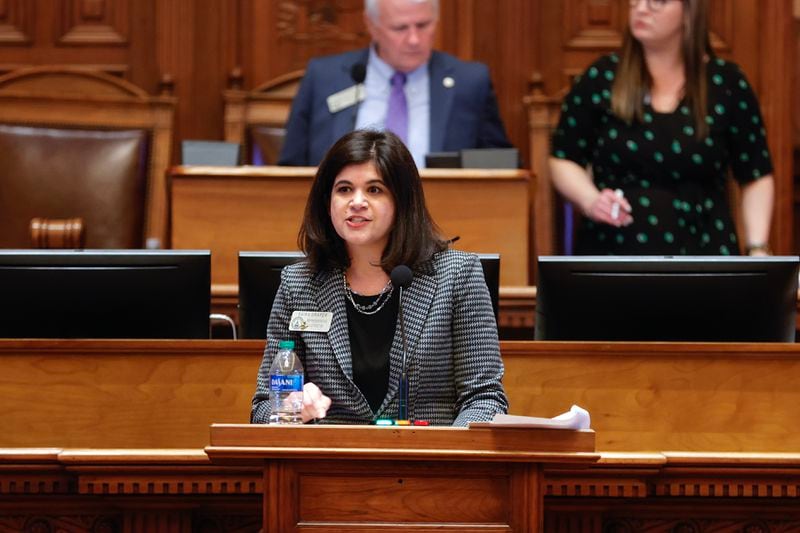A broad elections bill that fortifies activists’ ability to challenge voters’ eligibility, eliminates counting ballots with computer QR codes, and strengthens ballot security requirements passed the Georgia General Assembly late Thursday.
The Republican-sponsored bill would change election rules just before a high-stakes presidential race in which Georgia could again be a crucial swing state.
The legislation also includes a provision that would make it easier for third-party candidates for president — such as Jill Stein of the Green Party — to get on the Georgia ballot as long as they’re also on the ballot in at least 20 other states or territories. A Libertarian Party presidential candidate is already allowed on the ballot after the party received enough votes in 2022 to qualify.
Independent candidates such as Robert F. Kennedy Jr. would still have to collect at least 7,500 signatures to appear on the ballot.
It’s the furthest-reaching elections bill since Georgia’s voting overhaul was approved months after the 2020 presidential election, when Republican Donald Trump narrowly lost to Democrat Joe Biden. Senate Bill 189 passed the House and Senate along party lines in both chambers.
Democrats said the bill won’t increase trust in elections, despite promises by Republicans who have changed state voting laws every year since the 2020 election.
“There’s a very vocal minority out there who will never be confident in the process so long as their candidate is not the winner,” said state Rep. Saira Draper, a Democrat from Atlanta. “I wish we had a policy of not passing laws to placate conspiracy theorists.”
Credit: Natrice Miller/AJC
Credit: Natrice Miller/AJC
Republicans said they want to prevent the possibility of voter fraud, and the bill was a priority of House Speaker Jon Burns. Investigations and recounts have upheld Georgia elections, and there’s no indication of more than a handful of ballots cast by ineligible voters in recent years
“What’s crazy to me is the idea that anybody in this chamber would be OK with a fraudulent vote canceling your legal vote,” said state Rep. John LaHood, a Republican from Valdosta. “We want to increase participation, and to do that we need to increase the confidence of our voters.”
This year’s measure is focused primarily on election operations and management, rather than voting access. That’s different from the election law passed three years ago that imposed a variety of regulations on absentee voting.
The most contentious part of the bill reinforced the ability of conservative activists to challenge the eligibility of voters who appear to have moved, a priority among Republicans who say outdated registrations could be used for fraud unless they’re more quickly removed. Illegal voting is rare in Georgia elections, but there have been isolated cases of people voting after they moved, or a voting for a recently deceased family member, resulting in sanctions from the State Election Board.
Activists have disputed more than 100,000 voter registrations since Georgia’s 2021 election law allowed any resident to contest unlimited registrations within their counties. County election boards have rejected most of those challenges.
Voting rights groups and Democrats say voter challenges have also targeted legitimate voters who haven’t moved, forcing them to attend public hearings to defend their right to vote and potentially hindering their ability to participate in elections.
Under the bill, voter challenges would be upheld if a Georgia voter registers in another state, claims a homestead exemption in a different jurisdiction or registers at a nonresidential address.
Challenges wouldn’t be considered within 45 days of an election, and they couldn’t target college students, members of the military and out-of-state government employees who have temporarily moved from Georgia.
“Allowing easier pathways for individuals to challenge more voters is concerning,” said Janetta Cureton of the voting rights group Fair Fight Action. “This is a problem, to potentially expand that pool of individuals who can be impacted.”
But Republicans who support the bill said it also protects eligible voters from frivolous registration challenges.
“Our bill actually makes the process of challenging more difficult, and it actually is designed to clarify what constitutes a valid challenge,” said state Rep. Victor Anderson, a Republican from Cornelia.
The American Civil Liberties Union of Georgia threatened to sue if Republican Gov. Brian Kemp signs the bill into law, saying it “would make it easier for people to file baseless mass voter challenges.”
The bill also would ban counting votes recorded with QR codes starting in 2026, a change sought by both election skeptics and election security advocates who say voters can’t tell whether the code matches their choices.
The bill calls for ballot scanning machines to read either filled-in ovals or the text to tabulate voters’ choices. However, there’s no indication QR codes have been tabulated incorrectly in previous elections.
A related provision of the bill calls for state election officials to test technology that would scan the printed text on ballots, verifying the accuracy of voting machine counts. The state budget includes $5 million for that technology, which could be implemented in time for the November presidential results.
As for ballot security, the bill would require sealed containers for absentee ballots and documentation whenever election workers touch them. Many of these mandates mirror procedures already in use by many county election offices.
The General Assembly also approved a variety of other election measures Thursday, including proposals that would add more election audits and allow fewer voting machines on election day to account for voters who already turned out during early voting.
Georgia election bills
- SB 189: Would change rules for mass voter challenges, eliminate computer QR codes from ballots, add ballot security procedures, ease requirements for third-party presidential candidates to appear on Georgia ballots and enable special elections for DeKalb County Commission vacancies to potentially be held in May.
- HB 1207: Would require that election workers be U.S. citizens, allow fewer voting machines on election days, guarantee poll watchers close access, allow candidates to proof ballots for errors.
- HB 974: Would add watermarks to ballots, display ballot pictures online, require more audits of statewide elections, use technology to verify the accuracy of text on ballots.
- SB 368: Would prohibit foreign campaign contributions.
- HB 1312: Would reschedule canceled elections for Public Service Commission amid an ongoing court case over whether statewide elections weaken Black voting strength in violation of the Voting Rights Act.
This story has been updated to correct ballot access requirements for third-party and independent candidates and to correct the description of House Bill 1207.
About the Author









